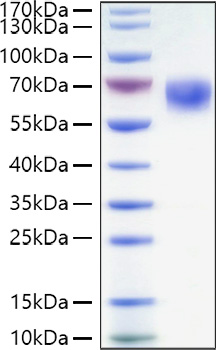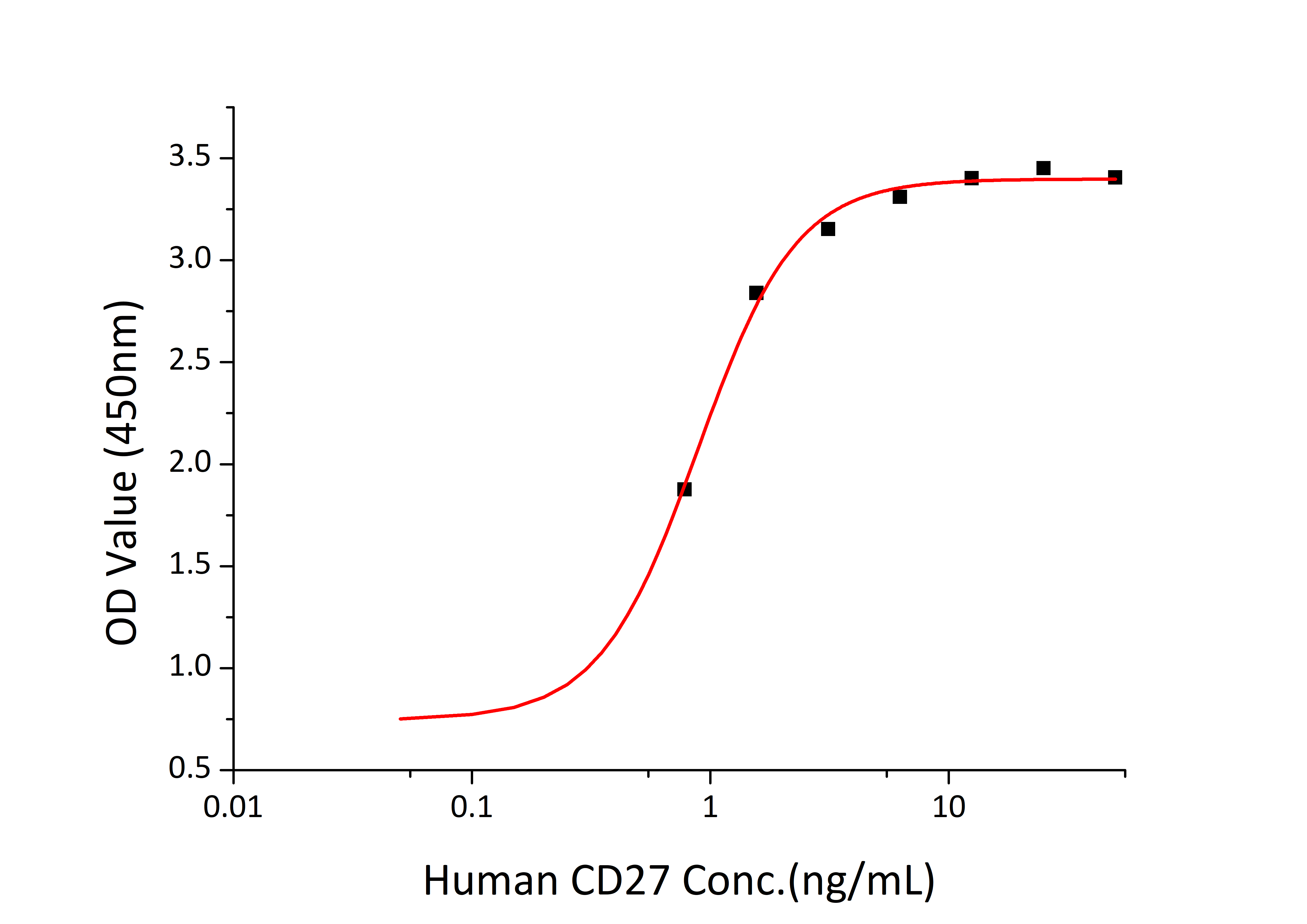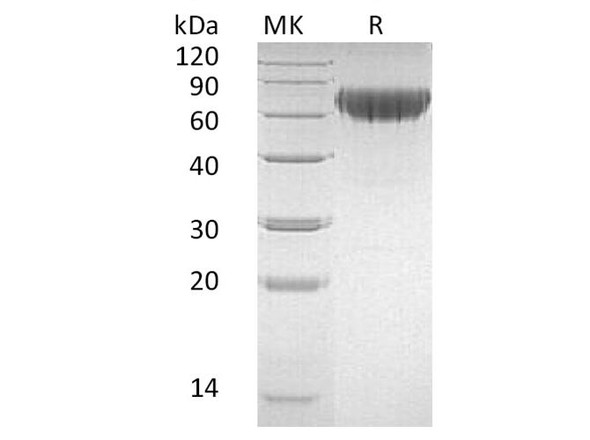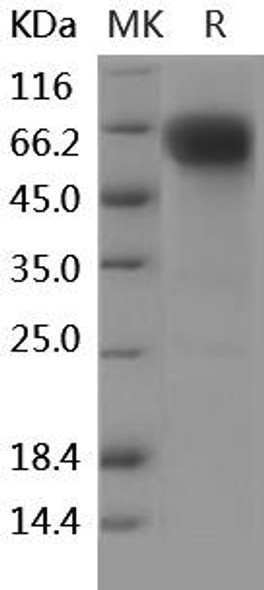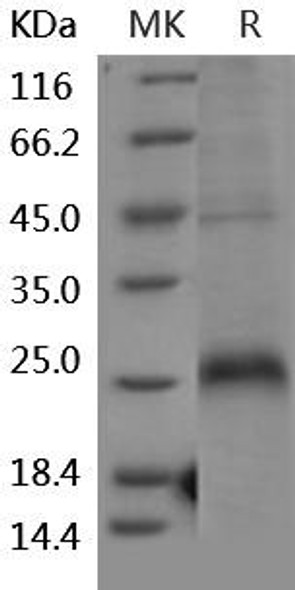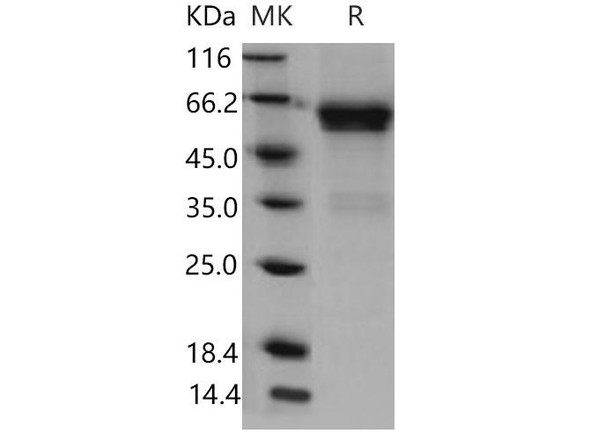Description
Recombinant Human TNFRSF7/CD27 Protein
The Recombinant Human TNFRSF7/CD27 Protein is a biologically active recombinant protein that plays a significant role in various cellular processes and signaling pathways in human biology. This protein is widely employed in immunological research, cell biology studies, protein-protein interaction analyses, and therapeutic development, providing researchers with a reliable tool for investigating TNFRSF7/CD27 function and its implications in health and disease.
This product (SKU: RPCB0898) is produced using HEK293 cells and features a C-hFc&His tag for convenient detection and purification. The protein exhibits a calculated molecular weight of 46.04 kDa with an observed molecular weight of 60-70 kDa under denaturing conditions, achieving ≥ 95 % as determined by SDS-PAGE.. Functional bioactivity has been validated through rigorous quality control assays, confirming its suitability for demanding research applications.
Key Features
| High Purity by Affinity Chromatography | |
| Mammalian & Bacterial Expression Systems | |
| High lot-to-lot consistency via strict QC |
| Product Name: | Recombinant Human TNFRSF7/CD27 Protein |
| SKU: | RPCB0898 |
| Size: | 10 μg , 20 μg , 50 μg , 100 μg |
| Reactivity: | Human |
| Synonyms: | CD27, S152, S152. LPFS2, T14, TNFRSF7, Tp55, S152.LPFS2, S152. LPFS2, T14, TNFRSF7, Tp55 |
| Tag: | C-hFc&His |
| Expression Host: | HEK293 cells |
| Calculated MW: | 46.04 kDa |
| Observed MW: | 60-70 kDa |
| Gene ID: | 939 |
| Protein Description: | High quality, high purity and low endotoxin recombinant Recombinant Human TNFRSF7/CD27 Protein (RPCB0898), tested reactivity in HEK293 cells and has been validated in SDS-PAGE.100% guaranteed. |
| Endotoxin: | < 0.1 EU/μg of the protein by LAL method. |
| Purity: | ≥ 95 % as determined by SDS-PAGE. |
| Formulation: | Lyophilized from a 0.22 μm filtered solution of PBS, pH 7.4. |
| Bio-Activity: | Measured by its binding ability in a functional ELISA. Immobilized Human CD27 at 2 μg/mL (100 μL/well) can bind Human CD70 with a linear range of 0.781-0.885 ng/mL. |
| Reconstitution: | Centrifuge the vial before opening. Reconstitute to a concentration of 0.1-0.5 mg/mL in sterile distilled water. Avoid vortex or vigorously pipetting the protein. For long term storage, it is recommended to add a carrier protein or stablizer (e.g. 0.1% BSA, 5% HSA, 10% FBS or 5% Trehalose), and aliquot the reconstituted protein solution to minimize free-thaw cycles. |
| Storage: | Store at -20℃.Store the lyophilized protein at -20℃ to -80 ℃ up to 1 year from the date of receipt. After reconstitution, the protein solution is stable at -20℃ for 3 months, at 2-8℃ for up to 1 week. |
CD27, also known as TNFRSF7, is a member of the TNF-receptor superfamily limited to cells of the lymphoid lineage, and exists as both a dimeric glycoprotein on the cell surface and as a soluble protein in serum. As a type I transmembrane glycoprotein of about 55 kDa existing as disulfide-linked homodimer, CD27 has been shown to play roles in lymphoid proliferation, differentiation, and apoptosis.It has an important role in the generation of T cell immunity and is an robust marker for normal memory B cells. It is a T and B cell co-stimulatory molecule, the activity of CD27 is governed by its TNF-like ligand CD70 on lymphocytes and dendritic cells. The CD27-CD70 interaction is required for Th1 generation responses to differentiation signals and long-term maintenance of T cell immunity, and meanwhile, plays a key role in regulating B-cell differentiation, activation and immunoglobulin synthesis.


